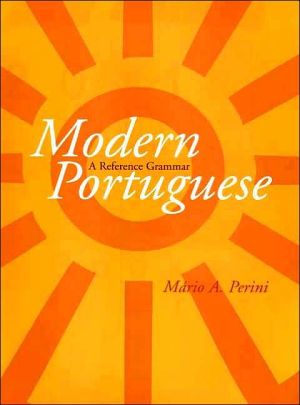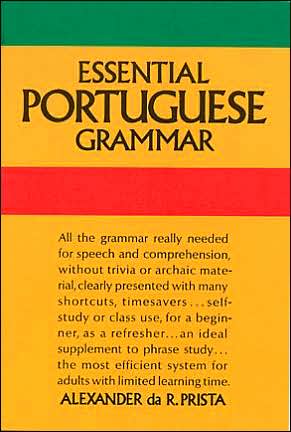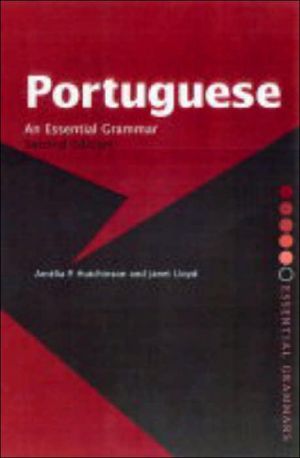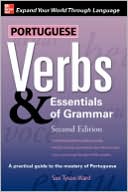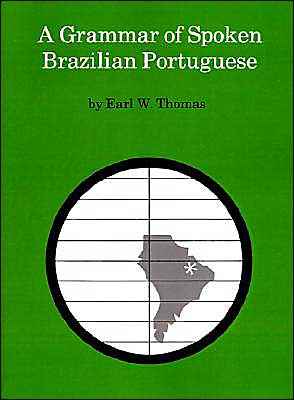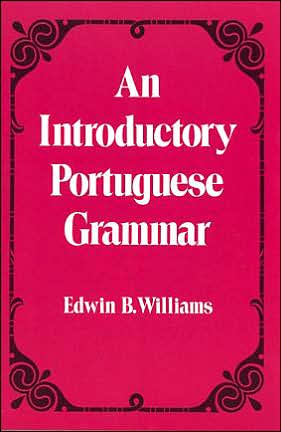Modern Portuguese: A Reference Grammar
This is the first comprehensive modern Portuguese grammar written for the English-speaking reader. The book covers in detail all the patterns of modern Portuguese as spoken and written in Brazil, focusing on those points which are especially challenging for the English-speaking student, such as the use of the subjunctive, use of the definite article, preterit vs. imperfect verb forms, prepositions, and many others. With a wealth of examples to clarify every topic and an extensive index, this...
Search in google:
This is the first comprehensive modern Portuguese grammar written for the English-speaking reader. The book covers in detail all the patterns of modern Portuguese as spoken and written in Brazil, focusing on those points which are especially challenging for the English-speaking student, such as the use of the subjunctive, use of the definite article, preterit vs. imperfect verb forms, prepositions, and many others. With a wealth of examples to clarify every topic and an extensive index, this indispensable grammar offers students and teachers easy access to all the information they need for in-depth study of Portuguese.Key features of the book: focuses on the needs of the English-speaking reader incorporates the results of recent linguistic research in jargon-free language emphasizes modern spoken Brazilian usage describes current Brazilian pronunciation in detail devotes a separate chapter to spelling problems discusses trends of the modern spoken language
Modern Portuguese\ A Reference Grammar \ \ By Mario A. Perini \ Yale University Press\ Copyright © 2002 Yale University\ All right reserved.\ ISBN: 0-300-09155-9 \ \ \ \ Chapter One\ The Portuguese Language \ Portuguese is the language spoken in Portugal and in Brazil; it has many speakers in several African nations as well, including Angola, Mozambique, Guine-Bissau, Cabo Verde, and Sao Tome, and is also spoken by immigrant minorities in the United States, Canada, and some countries of Western Europe. A conservative estimate puts the number of its monolingual speakers at about 190 million, which makes it one of the great languages of the world-not so widely spoken as English, Mandarin, and Spanish, but more so than French, German, and Italian.\ In all that vast area the standard written language is very uniform, differences in spelling and grammatical structure being small; educated Portuguese and Brazilians usually have no difficulty understanding each other's books and newspapers (except when regional vocabulary is used).\ As for the spoken language, differences are more salient. The speech of educated Africans usually follows very closely the European model. But in Brazil, where Portuguese is the only language used by the whole population and where it has been evolving independently for almost five centuries, the spoken language differs markedly from European Portuguese. Yet, the European and the Brazilian dialects are mutually intelligible, and free conversation presents no great problems. The linguistic distance between Portugal and Brazil, in what concerns the spoken language, can be roughly compared to that between British and African American English. And within Brazil, dialectal disparities are small, being comparable in importance to the variation of English across the United States.\ The linguistic situation in Brazil has given rise to periodic debates about whether or not Portuguese and Brazilian are separate languages. Yet this controversy has never gone beyond academic circles, and most authorities as well as practically all laypersons feel that the two languages are one and the same. I do not go into the issue here, even assuming that it is a substantive question-which it most probably is not. For my purposes it is enough to recognize that many differences exist, mainly in the spoken language. These will be mentioned at the appropriate places; and in the book as a whole, Brazilian Portuguese will be taken as the basic standard of reference.\ The distance between the spoken and the written language in Brazil makes it somewhat difficult to describe Brazilian Portuguese. These differences are rather pronounced in regard to certain points, for example, the use of the subjunctive mood (chapter 15); the use of se with nonreflexive verbs (chapter 20); nominal and verbal agreement (chapters 34 and 35); the structure of the relative clause (chapter 36); topicalized constructions (chapter 39); and many other important grammatical facts. These divergences are included in the text whenever possible, but it must be borne in mind that description of colloquial Brazilian is still fragmentary. No extensive studies have been made (for a very interesting initial attempt, see Castilho 1990-99)-that is, scholars are still far from being able to write a grammar of the colloquial variety of the language.\ On the other hand, the colloquial language is very uniform over the whole territory, and Brazilians of all classes have no trouble whatsoever understanding one another. The standard language as found in books, newspapers, radio, and television is, of course, even more uniform, and it is not possible to tell from grammatical evidence the region from which a text or a broadcast originates.\ The standard variety taught in schools has a certain degree of influence on the speech of educated persons, but no one ever comes to the point of using consistently the forms of the written language. That is, the influence of the standard language is never so strong that one can say someone is speaking standard Portuguese (except in such hyperformal situations as delivering a prepared speech, for instance). On the other hand, as with most languages, one can evaluate a person's degree of schooling from his or her way of speaking.\ The situation may be summarized thus: there is a highly uniform popular language and an even more uniform written standard. In between, one finds several varieties of semistandardized speech, used by more or less schooled people in varying degrees according to the formality of the situation. For instance, a person who says eles corre 'they run' in unguarded speech may use the standard form eles correm 'id.,' with the required plural ending -m, in a formal situation, such as when giving a lecture or speaking on television (one may compare the parallel situation in American English between he don't and he doesn't).\ This constitutes a complex sociolinguistic situation, and there is no way to include all this information in a survey like the one attempted in this book. Every effort will be made to call attention to such variation whenever it seems particularly important. But the phenomenon on the whole has not been satisfactorily described, and its very complexity precludes its inclusion in full in a reference grammar.\ Inevitably, thus, the language described in this book is a sort of compromise based on the modern written standard and liberally spiked with comments on features of the spoken language that find their way into the speech of even the most educated people. Any reference to grammatical facts that are confined to very formal written texts will be duly marked, so that the forms in question can be avoided in speaking and, if possible, in writing. To give one example, the simple pluperfect tense (as in eu fora 'I had gone') is never used in speaking and is never necessary even in writing, being replaceable by the compound form eu tinha ido 'id.'\ The first texts in a recognizable form of Portuguese (as distinct from Castilian, Leonese, and other languages of the Iberian peninsula) date from the late twelfth century, and by about 1300 a considerable body of literature had been produced, both in Portugal and in present-day Spain. Apparently, Portuguese, at the time not yet clearly distinguishable from Galician, was felt in those times to be an especially appropriate medium for lyric poetry and was used even by poets whose native language was Castilian. A famous example is the Cantigas de Santa Maria (Songs in praise of the Virgin Mary), written in Portuguese by King Alfonso X of Castile.\ Portuguese became the official language of the kingdom of Portugal, and in the sixteenth century it followed the fortunes of the Portuguese people in their spectacular expansion through South America, Africa, and Asia. With the publication of the first grammars (Fernao de Oliveira 1536; Joao de Barros 1540) and dictionaries (Jeronimo Cardoso 1562), the written language was standardized and has maintained a remarkable unity ever since-although there has never existed a controlling academy comparable to the French and Spanish ones. In Brazil the Portuguese language took root and is today the only language spoken by its inhabitants (more than 169 million, according to the 2000 census). In Africa, Portuguese competes with local languages, English, and creoles; nevertheless, it is the official language in the republics of Angola, Mozambique, Guine-Bissau, Cabo Verde, and Sao Tome and is known by educated people in those countries. Finally, I may mention modern Galician, the popular language of Galicia in northwestern Spain, which is so close to Portuguese as to be usually called a co-dialect.\ Throughout its eight-century history, the Portuguese language has been the vehicle of an abundant literature, ranging from the medieval cantigas to fifteenth-century historians to the great sixteenth-century classical poets (among whom foremost is Luis de Camoes), and so on down to modern times. Starting from the mid-seventeenth century, Brazil has been making an ever-increasing contribution, and in recent times African authors have joined the team.\ Nowadays the literary output of Portuguese is phenomenal, and authors like the Brazilians Jorge Amado and Paulo Coelho and the Portuguese Jose Saramago (Nobel Prize, 1998) are becoming known all over the world. Furthermore, technical material produced abroad is usually translated and published in Brazil and in Portugal, so that Portuguese is also the medium of education at all levels. While many educated people in Portuguese-speaking areas have some reading command of English (often also of French or Spanish), few Brazilians can speak a foreign language fluently, and living or doing business in Portuguese-speaking areas requires some knowledge of the national language.\ Portuguese in its written form is close to Spanish (and to Catalan), and a knowledge of those languages is a good first step in understanding Portuguese texts. Yet neither of them is mutually intelligible with Portuguese, especially in their spoken varieties. In Brazil, furthermore, except in the border areas, spoken command of Spanish is a rare phenomenon.\ (Continues...)\ \ \ \ \ Excerpted from Modern Portuguese by Mario A. Perini Copyright © 2002 by Yale University. Excerpted by permission.\ All rights reserved. No part of this excerpt may be reproduced or reprinted without permission in writing from the publisher.\ Excerpts are provided by Dial-A-Book Inc. solely for the personal use of visitors to this web site. \ \
ForewordAbbreviations1The Portuguese Language32Consonants93Vowels234Diphthongs, Triphthongs, Hiatuses435Joining Words496Notes on Spelling567Number and Gender in NP-Words718Inflection in Personal Pronouns979Numerals10610Articles, Determiners, Possessives, and Relatives11511The Verb12712Irregualr Verbs14313Auxiliaries15514Mood16715Subjunctive vs. Indicative in Subordinate Clauses17516Uses of the Infinitive20417Gerund, Participle, Imperative22318Tense23019Governed Tense25420Person25821Passive and Impersonal Sentences26222Notes on the Use of Certain Verbs27023Structure of the Noun Phrase29324Ordering of Modifiers Relative to the Head29725Ordering of Modifiers Relative to Each Other32326Use of the Article32927Other Nominal Constructions34928The Simple Sentence36729Use of Oblique Pronouns38130Adverbs and Adverbials39931Interrogation, Exclamation, Negation42032Prepositions44033Valency46834Nominal Agreement47835Subject-Verb Agreement48836Complex Sentences50637Conjunctions and Coordinators51538Pronominalization and Anaphora52739Topicalization53940Discourse and Dialogue Markers54541Derivation and Word Formation55542Trends of the Language567App. 1Regular Verbs579App. 2Irregular and Anomalous Verbs584App. 3Contractions597App. 4Days of the Week, Times of the Day, Dates601References605Index of Grammatical Subjects609
